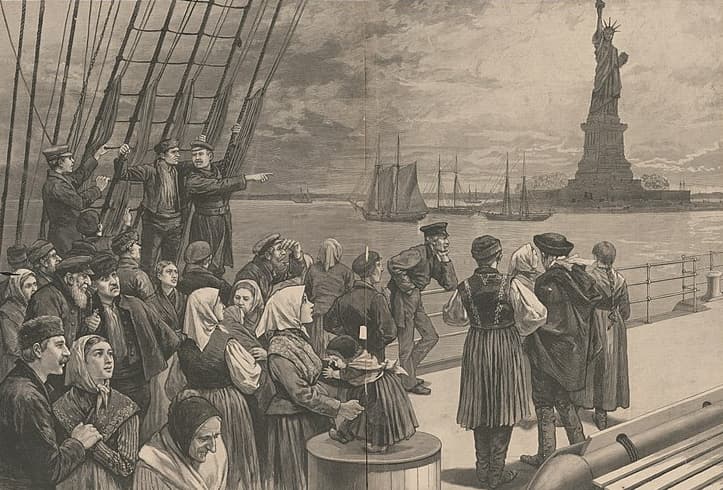On Immigration, Returning to America’s Libertarian Roots
At its founding, America exemplified the Libertarian Land ideal: no immigration restrictions of any kind.

What is the best immigration policy for the United States? At its founding, America exemplified the Libertarian Land ideal: no immigration restrictions of any kind. Policy distinguished residency from citizenship, imposing legal restrictions only on the latter.
Starting in the 1870s, the United States began excluding Chinese immigrants, workers who would break strikes, other East Asian immigrants, and those who could not pass a literacy test, finally closing the door on European immigrants in 1921. Since then, legal immigration has liberalized slightly but is still heavily restricted compared to the 19th century. This generates endless rancor and debate.
Libertarian land takes a different approach.
Libertarian Land makes no distinction between the well-being of its current residents and that of potential future residents. Instead, Libertarian Land regards any policy that expands freedom as desirable, regardless of who benefits. It is an accident of history and birth that some people already live in the United States and similar countries, enjoying the economic and social liberties, plus freedom from oppressive government.
Immigrants benefit enormously from the ability to migrate, often expending breathtaking effort to escape poverty, violence, or political oppression. Expanded immigration is plausibly the single most effective policy to enhance material well-being throughout the world; existing estimates suggest removing most restrictions would double world GDP.
Libertarian Land’s approach — valuing potential future residents as much as current residents — would be politically and philosophically difficult if immigration had serious negative impacts on receiving (or sending) countries. Then, even if benefits to immigrants vastly exceeded costs to others, society would face a complicated tradeoff.
In fact, receiving countries benefit enormously from expanded immigration, lowers labor costs and raises output. Immigration increases innovation and entrepreneurship. The increased demand for housing raises the wealth of receiving country homeowners. Locations that historically received more immigrants are richer a full century later.
Receiving countries might also experience costs from immigration: lower wages for certain jobs, worse fiscal imbalance, increased crime or terrorism, or a “damaged” culture.
Available evidence, however, fails to find major effects of immigration on native wages. Even if immigration reduces wages or employment for some, moreover, that is no different than what occurs under competition generally. Free markets create both losers and winners, but the outcomes are beneficial on net.
Immigrants might also impose a “fiscal externality” by taking up Social Security, Medicare, and other programs. Immigrants also pay taxes, however, which partially or more than offset their fiscal costs.
Any fiscal externality, moreover, is readily addressed by requiring a period of residence before eligibility, as already occurs for many programs. The fiscal externality is a reason to reduce or eliminate the social safety net (as in Libertarian Land), rather than to limit immigration.
Existing evidence also finds that, if anything, immigrants are less likely to commit crimes than natives and unlikely to participate in terrorism.
The claim that less restrictive immigration might damage the culture is also not persuasive. Those who migrate mainly value the American dream, and over a few generations they assimilate. Immigrants do affect the culture, via new music, food, art, and sports; Libertarian Land regards this as a feature, not a bug.
The most plausible negative from fewer immigration restrictions is that the sending countries might lose some of their most productive, innovative and entrepreneurial residents, thereby lowering productivity for those left behind.
Yet high-skill emigrants often transfer knowledge acquired elsewhere back to their home country; the net effect is at worst ambiguous. In 2022, immigrants around the globe sent more than $600 billion in remittances to friends and family. Easy immigration to rich countries likely helps victims of war, ethnic cleansing, and natural disasters more effectively than military or humanitarian interventions.
While immigration itself has large benefits, restrictions on immigration generate worse economic outcomes. Restrictions plausibly reduce migration to some degree, but they also drive it underground, with attendant violence and corruption. Pushing immigrants into the shadows likely reduces assimilation.
Minor caveats aside, therefore, immigration has huge benefits and only modest negatives for immigrants and everyone else. The question is then how much legal immigration?
Libertarian Land goes to the logical extreme: free immigration, with exceptions only for immigrants who would obviously generate large externalities (like, say, known terrorists). This recognizes that even modest restrictions are often costly and ineffective. Communicable diseases, for example, can readily enter a country via travel by legal residents, despite restrictions on immigration.
The United States is unlikely to mimic Libertarian Land in the near future, and the risk of short-term disruptions from vastly greater immigration might suggest gradual rather than drastic changes in policy.
Still, the message is clear: the United States needs more, not less, immigration.

